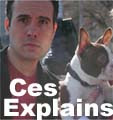From the Tribune:
"This is an absolute exclusion of Kevin Fox," Will County State's Atty. James Glasgow said during an emergency court hearing this afternoon requested by prosecutors in the Joliet courthouse. ***After so many instances where DNA evidence has exonerated people accused of crimes, we Illinoisans have become somewhat desensitized to such shocking reversals of fortune.
Today's developments marked a repudiation of a case started under Glasgow's predecessor, Will County State's Atty. Jeff Tomczak. Tomczak had said he would seek the death penalty for Fox before he lost re-election to Glasgow in November.
Nevertheless, there are still lessons -- other than the obvious one: that the authorities sometimes prosecute the wrong guy -- that we can learn from the wrongful prosecution of Kevin Fox.
One of the lessons that we should take from the Fox case is that, in our criminal justice system, decisions concerning XXX are not, and cannot, be divorced from politics.
When Kevin Fox was arrested in October, Jeffrey Tomczak, Will County State's Attorney at the time, was fighting for his political life against James Glasgow.
From the Sun-Times:
Tomczak had an inkling of just how tight his race with Glasgow was: Tomczak's father had just been indicted in Chicago's Hired Truck scandal, and the Sun-Times reported those Hired Truck companies gave $20,000 to Jeffrey Tomczak's campaign. There had been no break in Riley Fox's murder in nearly five months when Tomczak announced Kevin Fox's arrest on the eve of the election. ***Although Tomczak blasted the very idea that that Fox's arrest was designed more to help his campaign than solve the murder as "baseless", it seems clear that Tomczak rushed Kevin Fox's arrest and declared that he would seek the death penalty just five days before the election in an desperate attempt to keep his job.
In a bitterly fought rematch of the 2000 race, in which Tomczak had wrested the seat from Glasgow, the Democrat won the seat back Nov. 2 when voters chose him 121,000 to 112,000 over Tomczak.
So the next time we are asked to consider whether Illinois should keep its death penalty, in addition to the myriad examples of the wrongfully convicted on death row, we need to keep something else in mind: As long as there is a death penalty, it will sought, implemented and executed for political purposes. Whether or not you think it is right and proper for the State to kill its citizens, do you think that such decisions regarding life and death should be political ones?
In addition, the Fox case exposed the shortcomings of the media when it comes to criminal cases. The Fox exoneration was shocking to most of us because, since last October, we had only heard the authorities story of what happened to Riley.
If we think about this, the one-sided nature of the coverage should not come as a surprise. The job of the press is to tell a story and the press often only tells the authorities' story of the crime because it is the only story to be told.
The police and the prosecutors' story is called "the theory of the case". The theory of the case consists of what crime was committed, who committed the crime, where the crime was committed, how the crime was committed, and, often times, why the crime was committed.
The authorities have a who, what, where, when, and how for the crime because they must answer each of these questions at trial. And as any veteran of a junior high newspaper can tell you, who, what, where, when, and how are also the fundamental elements of a news story.
By contrast, an innocent defendant like Kevin Fox rarely has a story beyond "I didn't do it." If his story is really fleshed out it may extend to "I didn't do it. I don't know who did it. I didn't do it."
You can easily see why, even though the authorities version of the story may go on for many column inches, the press's account of defendant's story is usually confined to a single sentence of denial -- the defendant's story is just a single sentence of denial.
I don't suggest that there is anything that can be done to remedy this disparity, I just suggest that we all keep it in mind when we read stories of crimes in the press.
And finally, we should all recognize the limited utility of "confessions." From the Tribune:
A myth still persists among some in law enforcement that no one would confess to a gruesome crime he did not commit. A stronger conviction holds that no person of normal intellect and development would ever do so.And the assumption that "no one would confess to a gruesome crime he did not commit" is not a belief exclusive to "some in law enforcement." To varying degrees, we all subscribe to that myth. We all feel that they got the right guy when we hear that he "confessed."
Kevin Fox proved them wrong.
He wasn't a teenager. He wasn't mentally retarded. He had no particular deficiencies that would make him especially vulnerable to suggestion or the kinds of pressure tactics used perfectly legally by police interrogators.
Fox's attorneys suggest he was a normal guy who simply got worn down after a 14-hour interrogation and the trauma of losing his daughter. Contributing to his erosion of confidence about what really happened were promises of an involuntary manslaughter charge and quick release if he admitted his daughter's death was the result of an accident.
But after this month we should ALL recognize that "confessions" are not conclusive.
For the reasons above -- and reasons excluded due to restrictions in time and space -- Kevin Fox's vindication via DNA results is the most important story of the month.













No comments:
Post a Comment